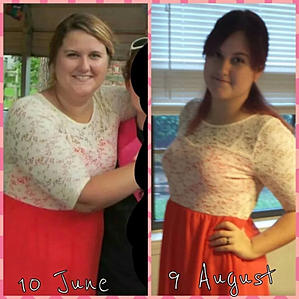As someone who has suffered from depression and anxiety for years, this topic really hits home for me. I can remember having attacks and unintentionally hurting myself if my clothes didn't look right. I can remember the year I spend starving and over excercising, popping fat burners, and barely drinking (except for binge drinking on the weekends to throw up) in order to lose weight and be perfect in my eyes. I remember the fear, the haze it had over my mind. The hunger, and how I loved/hated it. In the process of losing weight, I was also losing myself.

I'm not exactly sure what caused me to snap out of it. After that year I began to eat again. A lot. Of everything. My next struggle arose: I couldn't stop eating. I went from 125lbs to 190lbs within two years. I was ashamed of my body and myself. I wore dresses in order to cover up the fat. I would tear everything out of my closet to find an outfit I felt comfortable in.
What really saved me was starting 21 Day Fix by Beachbody. It teaches you how to eat correctly and each day has a different 30-minute workout. I'm proud to say that not only have I started losing weight, but I'm also feeling MUCH better mentally (and physically!).
The Effects of Clean Eating and Exercise with Mental Illnesses
Food
A number of cross-country and population-based studies have linked the intake of certain nutrients with the reported prevalence of different types of depression. For example, correlations between low intakes of fish by country and high levels of depression among its citizens – and the reverse - have been shown for many types of depression. Complex carbohydrates as well as certain food components such as folic acid, omega-3 fatty acids, selenium and tryptophan are thought to decrease the symptoms of depression.
Those with low intakes of folate, or folic acid, have been found to be significantly more likely to be diagnosed with depression than those with higher intakes. Similar conclusions have been drawn from studies looking at the association of depression with low levels of zinc and vitamins B1, B2 and C. In other studies standard treatments have been supplemented with these micronutrients resulting in greater relief of symptoms in people with depression and bi-polar effective disorder, in some cases by as much as 50%.

This study shows that people not getting the right important vitamins in their diet are more likely to suffer from mental illnesses like depression, anxiety, and bi-polar disorder. Gaining too much weight or feeling out of control with your eating habits can increase your depression and lead you to trying out fad diets, pills, and wraps. Not only are you more likely to feel further out of control but you are also spending a bunch of money on things you don't even need (which can make things even worse!).
A simple way to start taking control of your health and weight is by eating 4-5 small meals a day. Not only will that speed your metabolism back up, but studies show that getting the a regular amount throughout the day of the amino acid Tryptophan (found in protein) can influence mood for the better.
Fluids
Adults lose up to 2.5 liters of water every single day through the lungs as water vapor, the skin as sweat, and through the kidneys as urine! If you don't drink enough fluids (water especially!) you will start having dehydration symptoms such as irritability, loss of concentration, slower metabolism, and lower mental functioning.
Studies show that large amounts of caffeine (coffees, sodas, energy drinks, and tea... even fat burners!) which some people use to boost energy levels can increase blood pressure, anxiety, depression symptoms and sleep issues.
Caffeine also causes a diuretic effect in the body. It makes you urinate more which leads to faster dehydration. For this reason you should not rely on caffeine-based fluids to help replace the loss of fluids that naturally occurs.

Alcohol has a depressant effect on the brain and can result in a rapid worsening of your mood. It is also a toxin that has to be deactivated by the liver. During this detoxification process the body uses thiamin, zinc and other nutrients and this can deplete your reserves, especially if your diet is poor.
Thiamin and other vitamin deficiencies are common in heavy drinkers and can cause low mood, irritability and/or aggressive behavior, as well as more serious and long-term mental health problems.
Because the body uses important nutrients to process alcohol, people who experience depression should consider avoiding alcohol until they have recovered. Even then, because of alcohol’s depressant effects, they should consider drinking only small amounts – no more than once a week.
PLEASE, take note of this. Drinking while on medication can cause severe issues.
Exercise
This has been the most amazing change in my life. I hated it before. I always feel so much better now that I fully understand what all it does for me.
Exercise leads to the release of endorphins – feel-good chemicals in the brain that help us to relax and to feel happy. Exercise is particularly important for people with depression as it also gives structure and purpose to the day. Outdoor exercise that exposes us to sunlight is especially valuable as it affects the pineal gland and directly boosts mood.

Did you read that?! Exercise actually makes you happy! It works the same way sex does by triggering endorphins- happy hormones. If you are not used to working out you should try adding a 30-minute work out or a walk at least every other day to your routine.
Beachbody's 21 Day Fix was a great start for me. It is easily modified for any fitness level, including beginners. It also teaches you how to eat correctly and eliminates calorie counting. If you think you may be interested, click the link below.
So there you have it. Clean eating + correct hydration = Less issues with mental help. Talk to your doctor for more information on the effects of these two simple ways to help yourself.
Need help with a meal plan or learning how to eat correctly? Click the link below to contact me.
Sources:
Mental Health Foundation UK
Mental Health Foundation UK
No comments:
Post a Comment